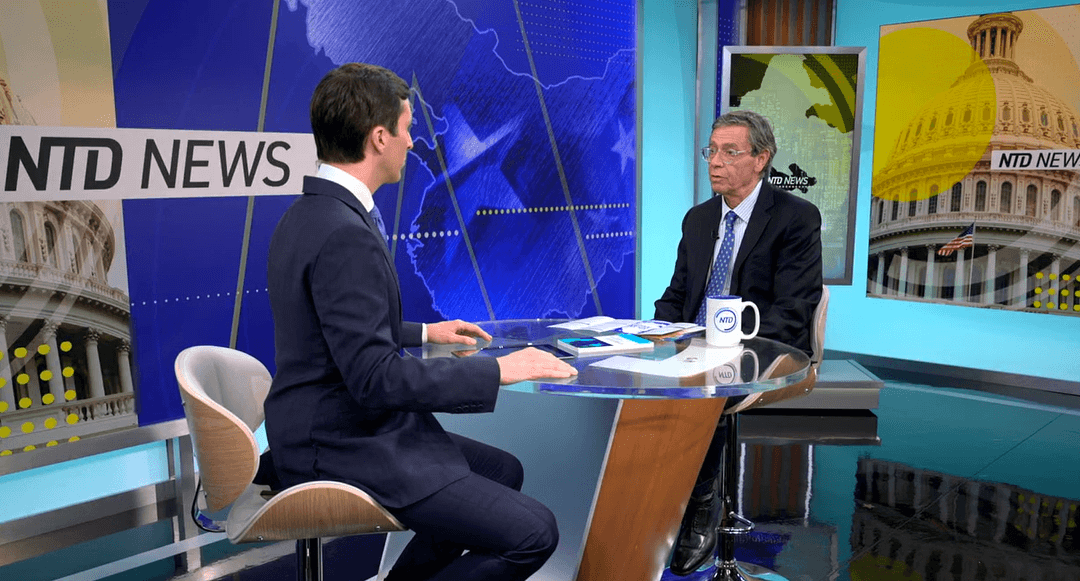Wayne Morrow’s quest for answers began when he saw that his America was not that of his parents. They were business owners who impressed upon him the importance of a strong family unit, higher education, and a good work ethic.
“I saw it become increasingly difficult to make a living,” he said. He saw the rise of a casual drug culture along with work ethic falling by the wayside, the erosion of trust in society, the inability of people to earn enough to pay for everything, and the mounting taxes his business owner parents faced.
Then a friend handed Morrow a book, and it all seemed to make sense. Morrow began to read voraciously—histories that predicted the future of his day, and how men schemed to bring it about. It was a story that seemed to repeat itself, he said. It’s a story where men of means seek power at the cost of others’ lives and freedom, one that has played out through ages time and again.
In 1974, The John Birch Society Founder Robert Welch gave a speech warning of expanded government and a resulting increase in taxes, wasteful spending, and an unbalanced budget despite the higher taxes, “wild inflation,” government wage control, and increasingly socialistic control over the economy and daily activity.
“Sound familiar?” Morrow said.
Morrow had a chance to meet Welch while in graduate school, and recalled a conversation they had in Welch’s office in Massachusetts.
“He says, ‘When they think they’re winning … they’ll become less secretive and they’ll become more apparent in the streets,’” he said. “‘That’s when they’re most vulnerable—and now go get them.’”
After a 27-year career as a research scientist, Morrow joined the society staff. Today, he’s the CEO of The John Birch Society, and, recalling that conversation with Welch, he felt the weight of responsibility.
Morrow often meets people who feel what the society warned of has come to pass, and who tell him that The John Birch Society “has been right all along.”
Who Was John Birch?
Welch named the society in 1958 for John Birch, a U.S. Air Force captain and Baptist missionary who was killed by Chinese communists 10 days after the end of World War II.Birch held a deep faith and decided early in life that he would become a missionary. He finished school early, graduating at the top of his class, and traveled to China in 1940 in Japanese-occupied territory, knowing it could be a dangerous mission. There, he studied Mandarin so he could preach to the Chinese, before joining the U.S. military a few years later.
In 1942, U.S. Lt. Col. Jimmy Doolittle led the first surprise attack on Japan after Pearl Harbor, and the crew landed in southeastern China, where they were rescued by Birch and Chinese civilians. Doolittle told Col. Claire Chennault about Birch, and Chennault recruited Birch as a field intelligence officer, though Birch had hoped to be a chaplain.
Birch would continue to preach to the Chinese while working to create an intelligence network. He provided critical information to the United States such as the location of a Japanese base, and helped evacuate Americans and allies. During the war, Birch had been wary of the Chinese communists and their intentions. After the Japanese surrendered, Birch saw the communists moving into the territory the Japanese had occupied, and heard news that they were killing villagers.
Days later, an American army officer interviewed the Chinese officer, who said that when he cautioned Birch to avoid the communists, Birch said that more important than his own safety was to find out whether the Chinese communists would be friends or enemies to America. Knowland said that if the circumstances of Birch’s death had been made public at the time, America would have known the Chinese communists as enemies, and might have set policies accordingly.
Truth and Hope
The society sees its role as an educational one, producing publications, pamphlets, documentaries, and other materials to teach Americans about the role of government and citizens. It also has a FreedomProject Academy online school that offers classical education to students K-12.Morrow says there is much cause for optimism, pointing to President Donald Trump’s growing voter base as one reason. That’s about 100 million Americans who think the government’s too large and that mass illegal immigration has to stop, he said.
“They’re singing the Birch song again. History’s proven us right, and all along, passing out literature and talking to people, now they’re connecting dots as well,” he said, adding that groups have sprung up all over the country in recent years echoing The John Birch Society.
“I’m optimistic because mankind does not want to be a slave,” he said. Morrow travels the world, and says he meets good people everywhere, people who want to be free and moral. Some are shocked when Morrow explains the history of many movements that erode freedom, but he often hears from them later, after they’ve done their own research, a word of gratitude when they confirm he has been telling the truth.
“I have a moral responsibility to tell you what’s going on,” he said.
It’s a responsibility that causes some sleeplessness, Morrow said, but points to the founders of the nation—people who sacrificed their wealth, their families, their fingers and toes to frostbite during war campaigns, and ultimately even their lives, all for freedom. “These people gave it their all,” he said. “How we got here and who we are—people ought to know that.”







